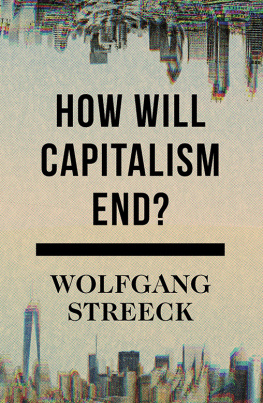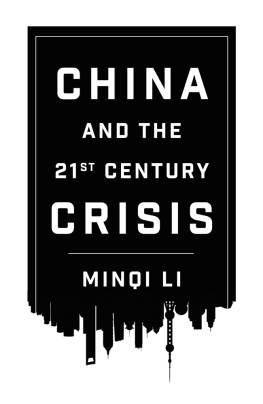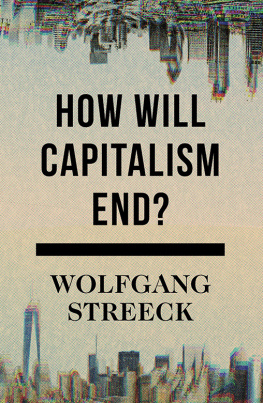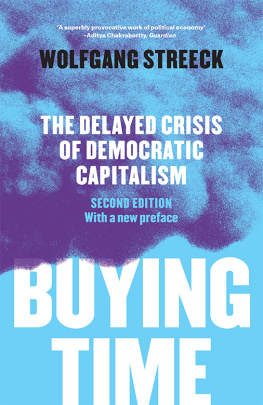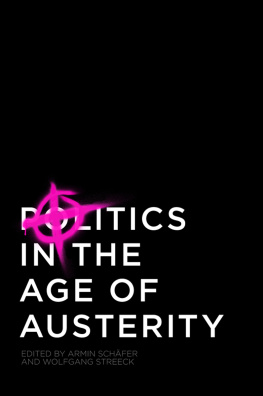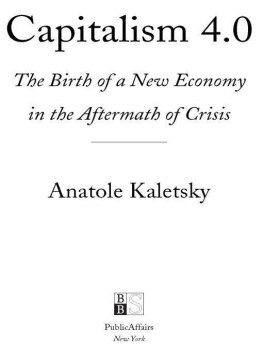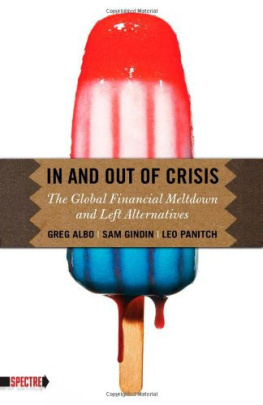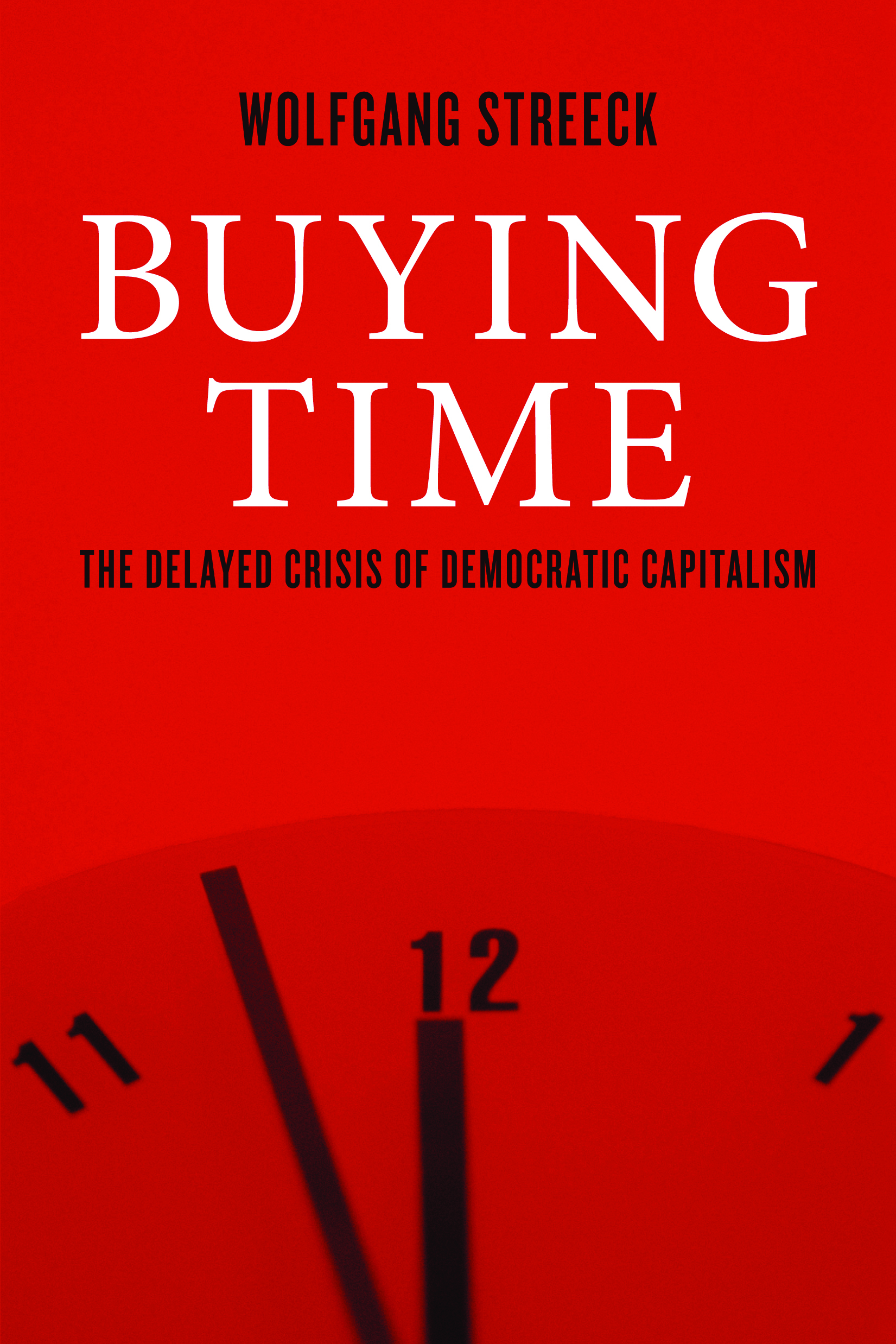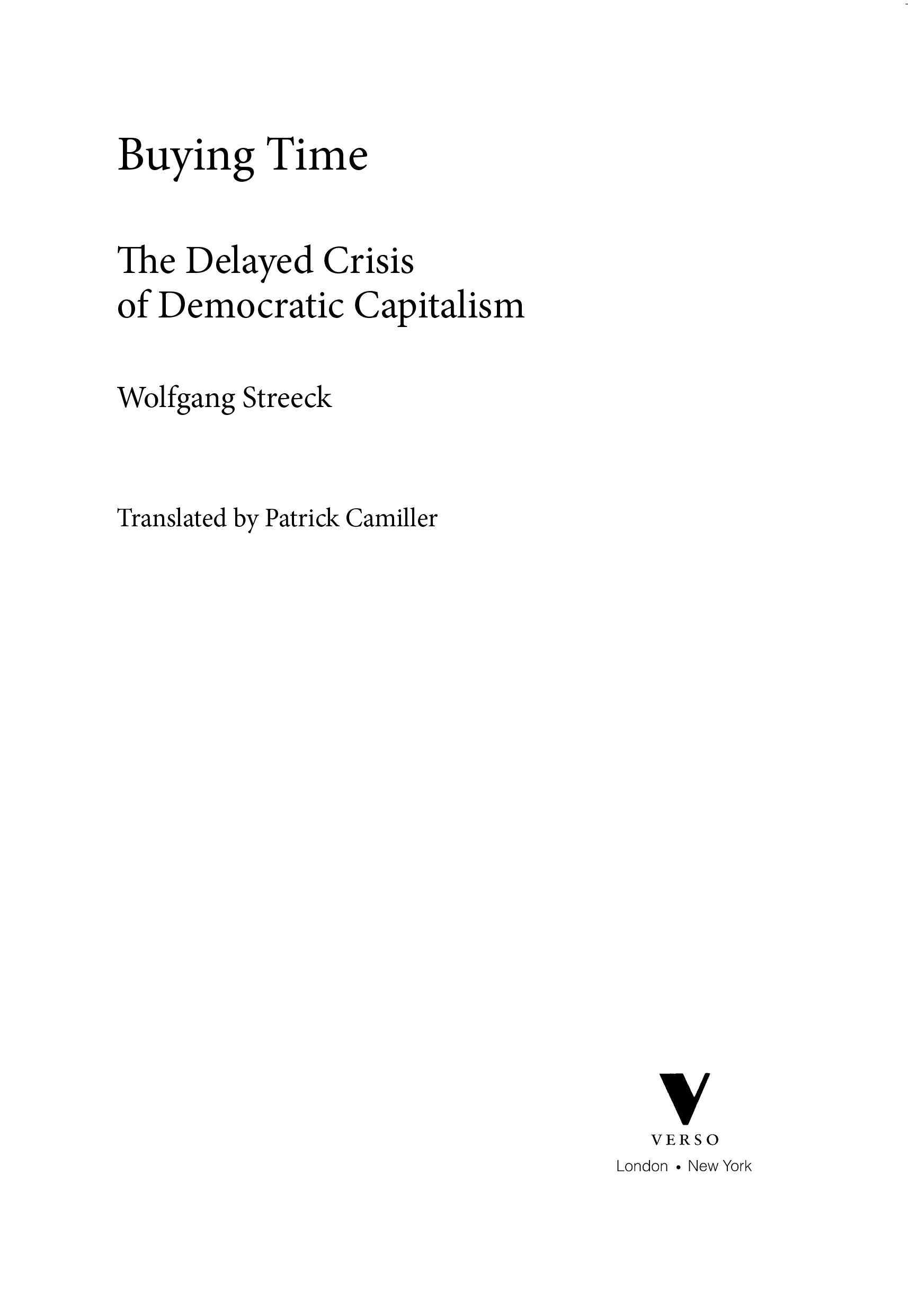This English-language edition first published by Verso 2014
Translation Patrick Camiller 2014
First published as Gekaufte Zeit
Suhrkamp Verlag Berlin 2013
All rights reserved
The moral rights of the author have been asserted
Verso
UK: 6 Meard Street, London W1F 0EG
US: 20 Jay Street, Suite 1010, Brooklyn, NY 11201
www.versobooks.com
Verso is the imprint of New Left Books
eBook ISBN-13: 978-1-78168-619-5 (US)
eBook ISBN-13: 978-1-78168-551-8 (UK)
ISBN-13: 978-1-78168-548-8 (PBK)
ISBN-13: 978-1-78168-549-5 (HBK)
British Library Cataloguing in Publication Data
A catalogue record for this book is available from the British Library
Library of Congress Cataloging-in-Publication Data
Streeck, Wolfgang, 1946
[Gekaufte Zeit. English]
Buying time : the delayed crisis of democratic capitalism / Wolfgang Streeck; translated by Patrick Camiller.
pages cm
First published as Gekaufte Zeit, Suhrkamp Verlag, Berlin, 2013.
ISBN 978-1-78168-549-5 (hardback) ISBN 978-1-78168-619-5 (ebook)
1. Capitalism. 2. Neoliberalism. 3. DemocracyEconomic aspects. 4. Economic policy. 5. Financial crises. I. Title.
HB501.S919513 2014
330.122dc23
v3.1
Contents
INTRODUCTION
Crisis Theory: Then and Now
Buying Time is an expanded version of the I cannot say that I was a disciple of Adorno. I attended some of his lectures and seminars, but did not understand much; thats how it was in those days, and people accepted it. Only later, more or less by chance, did it become clear to me how much I had missed as a result. Thus, my strongest memory of Adorno has remained the deep existential seriousness of his work in stark contrast to the indifference with which so much social science is conducted today, after decades of professionalization.
Fortunately, no one will think me qualified to assess Adornos work. I have in any case refrained from seeking specific links between what I have to say and what Adorno left behind; that would appear forced and presumptuous. If there are things in common, they are of a very general nature. One is my intuitive refusal to believe that crises will always turn out well in the end an intuition that I certainly think I can find in Adorno too. He lacks the kind of functionalist sense of security that one sees in Talcott Parsons, for example; there is never any guarantee that everything will sooner or later automatically return to equilibrium. He could not bring himself to share , I offer a (not very realistic) proposal to address a partial aspect of the crisis. Problems may be such that there is no solution to them or anyway, none achievable here and now. If someone were to ask me reproachfully where was the positive, this would then indeed be a case where I could appeal to Adorno. For his reply, much better formulated, would doubtless have been: what if there is nothing positive?
My book treats the financial and fiscal crisis of contemporary democratic capitalism in the light of Frankfurt School crisis theories of the late 1960s and early 1970s a period when Adorno was still active and when, of course, I was studying in Frankfurt. The theories I address were attempts to grasp the incipient radical changes in the postwar political economy as aspects of a process encompassing the whole of society, in which more or less eclectic use was made of elements of the Marxist tradition. The accounts from which I set out were anything but uniform; many were no more than sketches and, as one might expect, changed with the course of events, in ways often unnoticed by the authors themselves. On looking back at them, one also repeatedly finds a stubborn insistence on minor differences within the same theoretical family, which today appear irrelevant or even incomprehensible. For this reason alone, the point at issue cannot be who then was more right than others.
The theoretical endeavours of the Frankfurt years also demonstrate how social-scientific knowledge is unavoidably tied to its time. Nevertheless, it might be possible to link up with 1970s theories of the crisis of late capitalism in grappling with present-day events and not only because we now know again, and are again able to voice, what was forgotten for decades or dismissed as irrelevant: that the economic and social order of the wealthy democracies is still a capitalist order and can be understood, if at all, only with the help of a theory of capitalism. In retrospect, we can also see what was then imperceptible (because it was still self-evident or had already become self-evident ) or what people were unwilling to perceive (because it stood in the way of their political projects). If, despite all the theoretical efforts, there was a failure to see important aspects of the real world, not to mention foresee what was coming, this may serve to remind us that society faces an open future and that history is unpredictable a fact which the social sciences have not always fully appreciated. On the other hand, however great the changes, much that was seen in the past and then forgotten can be recognized in the present. Little as we can rely upon static observation of the world, a social formation may appear identical with itself for decades if it is conceived as a developmental process containing structures that change over time, whose logic can be understood retrospectively even if it does not lend itself to prediction.
My analyses treat the financial and fiscal crisis of contemporary capitalism as part of the developmental continuum of society as a whole. The starting point is the end of the 1960s, and I describe the process, from todays vantage, as a dissolution of the regime of postwar democratic capitalism.Adorno himself had not been directly involved in it. The crisis theory of the Frankfurt School heuristically assumed a relationship of tension between social life and an economy ruled by the imperatives of capital valorization and capital growth a tension which, in the postwar formation of democratic capitalism, was mediated by government policy in a number of historically unfolding ways. Social institutions, especially in the spheres of politics and economics, thus appeared as constant objects of contention, inherently contradictory, unstable and only provisionally, if at all, in equilibrium, involving no more than temporary compromises between fundamentally incompatible action orientations and social systems. In keeping with the tradition of political economy, the economy of society was understood as a social system (not simply a technical system, or one determined by laws of nature), which consisted of power-backed interactions between parties with different interests and resources.
By taking up theories of the 1970s and attempting to update them in the light of four decades of later capitalist development, I treat the current crisis of democratic capitalism within a dynamic perspective embedded in a sequence of development.processes or states of affairs as they are connected with and within processes. Theories that treat structures or events as unique, in the sense of detached from previous structures or events, can be fundamentally misleading. For everything social takes place in time, unfolds over time, becomes more self-same in and over time. We can understand what we see today only if we know how it looked yesterday and where it might be heading. Everything at hand is always moving along a path of development which is why the three main parts of this book contain so many diagrams and stylized narratives representing historical processes.


